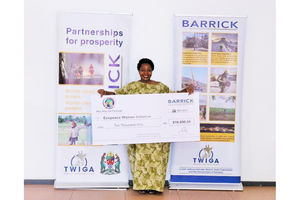THINKING ALOUD: 40 years of exemplary Tanzania-Sweden partnership
What you need to know:
I was an active member of this partnership at the Muhimbili University of Health and Allied Sciences (Muhas) for most of the 40 years and at one time I was the head of the Malaria research programme within the partnership, thus I will write about my experience on the modus operandi of this unique partnership.
I understand the above bilateral collaboration is celebrating 40 years of its existence. During my working life I was part of this partnership and I will do injustice to myself if I remain silent about how this partnership shaped my entire life and career.
I was an active member of this partnership at the Muhimbili University of Health and Allied Sciences (Muhas) for most of the 40 years and at one time I was the head of the Malaria research programme within the partnership, thus I will write about my experience on the modus operandi of this unique partnership.
The history of Muhas would remain incomplete and maybe Muhas would not be what it is without mentioning the Swedish-Tanzania Partnership (STP). Most of the present senior leadership at Muhas is a product of STP, former Vice-Chancellor, Prof Elphata Kaaya, did his PhD at Karolinska within STP and so did the former Deputy Vice-Chancellor. The expansion of the academic programme at Muhas was because many of us including myself were trained during the earlier days and we were able to attain highest academic qualifications and was instrumental to start postgraduate programmes, which also today includes funding for research projects within the postgraduate studies.
During my working life I had the opportunity to be part of many bilateral collaboration with many countries but the uniqueness of STP was that it was a truly symbiotic association. Both Sweden and Tanzania benefitted. Research funding was intertwined with human capacity building for both the countries and that’s the reason why many of us were able to complete PhD studies initially at Karolinska and later were able to supervise PhDs at Muhas. Similarly many Swedish students were able to pursue their studies within the STP and today are the new generation interested in international health and actually taking over the positions of their seniors. As far as my recollection goes there was zero attrition at Muhas. All who went to Karolinska for studies returned to Muhas, none remained in Sweden or another country in the West, there was zero brain drain.
Another novelty of STP was the introduction of a sandwich PhD programme based on the format of thesis based on publication of research papers. This was a new model unlike the British model. I think the zero attrition was because we did research in Tanzania and went to Karolinska for special tests that were not available then in Tanzania, attend the required PhD courses and perform data analysis and publication. In a way this was a very holistic model to create a well-rounded academician. Today this model has been adopted by Muhas.
It would be out of scope of this article to enumerate all the research findings but most of the research done was very relevant to the Tanzanian health problems. As an example the malaria group that I headed has contributed to the epidemiology, diagnosis, treatment and control of malaria in Tanzania. The findings are today benefiting millions of Tanzanians and similarly the HIV group, maternal health group etc. all did research that is benefitting the Tanzanian population.
Apart from PhD studies, those of us who went to Sweden learnt quite a lot about culture, diversity and many other life experiences that added to our academia and wisdom. We also made life long true friends with whom we continued to collaborate to sustain the STP and bring it to higher levels. All this was possible because of the trust, respect and commitment of this partnership. There were many challenges as it is normal in any large groups of people where personalities and understandings differ but these were gradually resolved through dialogue without compromising the goals of the partnership.
I think the foundation of this partnership was strongly built by two prominent and visionary leaders of our nations. The late Olof Palme and Mwalimu Nyerere. The deep understanding of these leaders, I believe has been the driving force and success of this partnership.
Another issue is the priority areas of research and collaboration, this should be a wide debate of all stakeholders and should not be dictated by Costec, a consensus is important otherwise diseases like NCD will be neglected. This partnership has been instrumental in developing university and higher education in Tanzania, UDSM and Muhas would not be what they are so creating new research priorities should not side line or marginalize these public institutions. Let me end here by saying to our partners tack så mycket, “thanks so much.”



